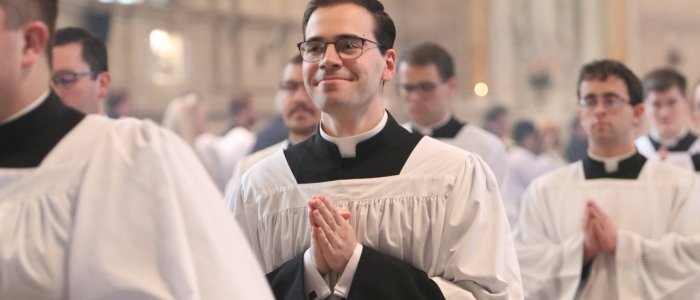Priestly Formation | Configuration Stage | Theological Seminary | Human Dimension
Human Dimension
The purpose of Human Formation in the Seminary Theologate is to assist the seminarian in his task of becoming a man of integrity with the personality necessary for priestly ministry in the Church. It “seeks to prepare men to be bridges for, not obstacles to, the spread of the Gospel.” (PPF, 83) The community life of the seminarians and the various services and co-curricular programs of the Human Formation Program are ordered in such a way that the seminarian learns to be well-oriented to the truth, respectful of every person, compassionate, just, balanced in judgment and behavior. Regularly scheduled Human Formation Conferences seek to address issues surrounding the seminarian’s physical well-being; habits of good nutrition and exercise, freedom from addictive behaviors; as well as addressing the essential issues in the development of a healthy emotional life; the establishment of mature friendships, maturity in dealing with authority, the formation of a settled disposition for celibacy and the qualities necessary for leadership and positive social interaction within a community. The Dean of Men assists the Rector in fostering the development of these program goals with the aid of the Theology Formation Committee and the Human Formation Committee.



Upon entering Saint Charles Borromeo Seminary, each seminarian is assigned an individual formation advisor, who meets with the seminarian monthly during each semester to discuss his progress. Formation advisors work with candidates to develop and integrate thoroughly the necessary priestly qualities and virtues in their lives. The seminarian’s personal growth is examined in the areas of human, spiritual, intellectual, pastoral, physical, social, apostolic, and emotional development. This process ensures that the candidate will grow in the virtues that will enable him to be a priest of the highest personal integrity.
While all seminarians in the Theologate will have had some experience in a Seminary College or Pre-Theologate, the goals and expectations are related but different. It is assumed in the Theologate, that certain life lessons and personal disciplines (punctuality, personal responsibility, accountability to others, defined study habits etc.) have already been appropriated and internalized. In contrast to the strict rules experienced in a Seminary College, which serve not to simply limit the freedoms of the men engaged in the program but seek to introduce a seminarian to a structured life as well as foster an appreciation for a disciplined life, the rule of life in the Theologate relaxes some of the exterior structures and rules so that a seminarian may freely give evidence to an interiorization of a well-disciplined life (Ratio fundamentalis institutionis sacerdotalis, §26). Thus, previous life lessons (whether acquired in a College Seminary, College, work experience or Pre-Theologate) are not to be forgotten, but are rather to be built upon in the Theologate.


